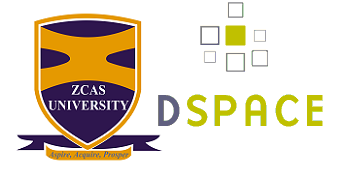Please use this identifier to cite or link to this item:
http://41.63.8.17:80/jspui/handle/123456789/106Full metadata record
| DC Field | Value | Language |
|---|---|---|
| dc.contributor.author | Kawimbe, Sidney | - |
| dc.date.accessioned | 2022-09-02T10:44:54Z | - |
| dc.date.available | 2022-09-02T10:44:54Z | - |
| dc.date.issued | 2022-07 | - |
| dc.identifier.issn | 2320-9186 | - |
| dc.identifier.uri | http://41.63.8.17:80/jspui/handle/123456789/106 | - |
| dc.description.abstract | The study sought to assess the uptake of Information Communication Technologies (ICTs) for online learning in institutions of higher learning during the novel corona virus disease (COVID-19) pandemic. In March 2020, Zambia announced its first two clinically confirmed COVID-19 cases. In the same month, the government announced the indefinite closure of all schools including institutions of higher learning in a bid to curb the spread of the disease. Forthwith, statutory instruments Nos.21 and 22 were issued under the Health Act to guide the manner the pandemic was to be tackled. In a bid to ensure continued learning, most institutions of higher learning had to discontinue face-to-face pedagogies and switched to virtual platforms of learning. The use of ICT platforms and tools for online teaching and learning has become a competitive tool for institutions for higher learning and industry as a whole. The study was designed in such a way as to asses a preparedness of institutions of lecturers to deliver lectures and learners to receive lessons using online platforms. It also sought to determine effectiveness of carrying out assessments and evaluate the challenges delivering lectures using online platforms. A total of five (5) higher learning institutions were purposively sampled from the Higher Education Authority (HEA) database. The respondents from these include administrators of institutions, lecturers and students and data were collected through interviews and questionnaires. A mixed method approach was employed. A total of 765 respondents were sampled but 473 were actually enumerated resulting in a percentage response rate of 61.8%. The data was analysed quantitatively and qualitatively. Results indicate that, higher institutions were not very ready to deliver lectures online due to inadequate investment in ICT infrastructure; lack of and/or unstable internet connectivity; power outages; inadequate ICT delivery skills coupled with lecturers and student perception pertaining to online delivery. Lecturers were not prepared and, in some cases, were unable to fully utilise ICT for online teaching and evidenced by a mean value of 2.65 which fell in the interval 3.5 to 4.2 revealing a notable “Bad” overall experience justified by a higher percentage distribution of 55.1%. This indicate that lecturers’ capacity to use gadgets was reasonably bad at 55.1%. It is recommended that higher learning institutions invest heavily in ICT infrastructure and train lecturers and other support staff. | en_US |
| dc.language.iso | en | en_US |
| dc.publisher | Global Scientific Journals | en_US |
| dc.relation.ispartofseries | Volume 10 Issue 7; | - |
| dc.subject | ICTs | en_US |
| dc.subject | Online learning | en_US |
| dc.subject | Infrastructure | en_US |
| dc.subject | COVID-19 | en_US |
| dc.subject | Delivery skills | en_US |
| dc.title | Assessment of uptake ICTs and other interventions to Deliver Online Learning During the COVID-19 Pandemic: The Case of Institutions of Higher Learning in Zambia | en_US |
| dc.type | Article | en_US |
| Appears in Collections: | Research Papers and Journal Articles | |
Files in This Item:
| File | Description | Size | Format | |
|---|---|---|---|---|
| Assessment_of_uptake_ICTs_and_other_interventions_to_deliver_online_learning_during_the_covid_19_pandemic_the_case_of_institutions_of_higher_learning_in_Zamb.pdf | 900.78 kB | Adobe PDF | View/Open |
Items in DSpace are protected by copyright, with all rights reserved, unless otherwise indicated.




